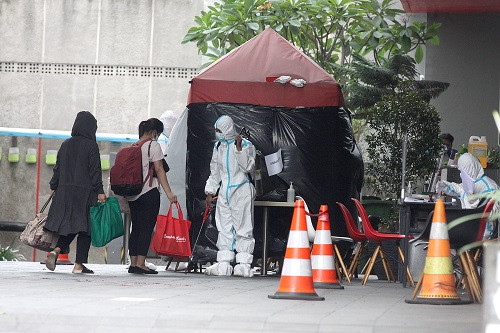COVID-19 end still far away
Scientists have warned that infection after vaccination remains possible, as the human body needs time to fully have an immune response after the first shot.
Change Size

F
or nearly the past year, the daily lingo of “increase”, “positive” have painted a gloomy picture of our life as a nation, while “decline” and “negative” would define our success.
Yes, we are talking about the COVID-19 crisis, which has affected nations indiscriminately. The paralysis may prolong for another year — or more until the ongoing mass vaccination program manages to reach herd immunity.
Nearly 11 months into the pandemic, Indonesia’s COVID-19 transmission curve has continued to climb and we will soon join the club of countries that have registered 1 million cases. There are already 18 countries on the list, with the United States taking a commanding lead with 25.7 million — or more than one-fourth of total infections.
In fact, developed countries like the US, the United Kingdom, France, Italy and Germany are in the top 10, but that’s due to their testing and tracing capacity, which other countries cannot match. The US and the UK, for example, have a testing capacity of more than 900,000 per 1 million population.
Indonesia is entering the 1 million mark with just over 31,000 tests per 1 million population, which means the current data may not reflect the country’s real condition. As of Monday, the novel coronavirus has killed more than 28,100 people, while nearly 809,500 patients have recovered across the country.
Doni Monardo, the chief of the national COVID-19 task force and National Disaster Mitigation Agency (BNPB), is among the latest officials to contract the virus. Doni tested positive on Saturday after a series of work visits in earthquake-affected areas in West Sulawesi and flood-hit South Kalimantan.
As a person in charge of the COVID-19 response and who undoubtedly has tried his best to practice what he preaches about the need to wear masks, wash one’s hands with soap and maintain a distance, Doni’s contracting the virus is yet another reminder against complacency. Doni said he might have gotten infected when he took off his mask to eat.
Complacency could be the biggest challenge now that mass vaccination has begun. In the first stage of the inoculation program, 1.4 million health workers will receive a double-dose regiment.
Scientists have warned that infection after vaccination remains possible, as the human body needs time to fully have an immune response after the first shot. Until immunity is built, vaccinated people are still vulnerable. Scientists remain in the dark, too, as to whether the vaccines can protect people from the new, more dangerous variant of the virus, which has now spread in more than 60 countries.
Prominent doctor Anthony Fauci has suggested that adherence to health protocols should remain the rule of the game even after vaccination. Only if 70 to 85 percent of the world population is vaccinated, could we hope to beat COVID-19.
More still has to be done if Indonesia wishes to reverse the course of the COVID-19 spread. Improving surveillance, contact tracing, contact quarantine and case isolation, and expanding the capacity of laboratories to conduct tests are on the list of things that still need to be done.









